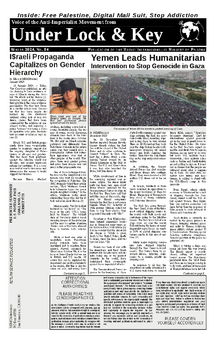
The Free Speech Society Presents: The Conflict Resolution Committee
All power to the people who do not fear real freedom!!!
Mission Statement:
In the aftermath of two small-scale race-based "isolated" incidents that occurred on B-facility in January of 2016 at Kern Valley State Prison, the Free Speech Society was able to successfully initiate a conflict resolution committee as a part of the inmate advisory council (IAC) that has been established at this prison.
The conflict resolution committee ensures the de-escalation of potential conflicts between various groups/formations on B-facility. As it constitutes a body of like-minded individuals that is both representative of the totality of the various groups/formations on B-facility, but also capable of resolving potential or actual conflicts in a responsible, positive, and expeditious fashion. In the past, Kern Valley State Prison (KVSP) administrators, which is inclusive of California Department of Corrections and Rehabilitations (CDCR) headquarters in Sacramento, California have made errors in one form or another, by failing to ensure the engagement of the primary stakeholders that are representative of those groups/formations actually engaged in a conflict, nor has there been a body of "like-minded" individuals specifically tasked with resolving potential conflicts before they mature into actual hostile-based conflicts, whereby unnecessary disturbances become manifest, which jeopardize the safety and security of both prisoners and staff.
Per Departmental Operations Manual (DOM) 53120.5.3 (viz. "Special Concern Sub-Committee") the KVSP B-facility Men's Advisory Council will enact the Conflict Resolution Committee (CRC). The CRC is convened for the sole purpose of resolving potential and actual conflicts on B-facility whenever and wherever they occur, and effectively articulating these resolutions to the entire prisoner population, with special attention given to the groups/formations in conjunction with the Agreement to End Hostilities (AEH).
Because appropriate representation is essential to the resolution of conflicts in an effective and responsible manner, the composition of the CRC will reflect prisoner representation from each specific group/formation who will in turn be responsible for engaging and positively resolving any subdivisions in these groups.
A basic outline of the CRC representative body will consist of a representative from each of the following groups/formations:
- BGF
- Surenos
- Whites
- Others
- Crips
- Bloods
- Mexican nationals
- Bay area Blacks
- Hoovers
- Muslims
- 415
Because of the sensitive nature of this special concern sub-committee, the CRC must have access to the units on B-facility, per approval of the facility captain. The daily activities of the CRC are designed to increase dialogue across cultural lines of every formation/group to promote a stronger foundation upon which issues can be put forward and resolved in a constructive manner. Communication and timing are essential components to preventing conflicts before they mature into hostile-based conflict. Therefore, CRC members must be able to talk to who they need to, when they need to. Our objective is to be proactive in resolving potential and/or actual conflicts within the general population. All prisoners are encouraged to relay any and all potential conflicts to the CRC so they can be resolved in an expeditious manner. The function and activities of this committee shall be to ensure equal and effective representation of the entire general population in the resolution of potential and actual conflicts on B-facility. The entire CRC body will abide by the by-laws of the Inmate Advisory Council (IAC).
Our Struggle Continues!!!For more information about the Free Speech Society go to: www.freespeechsociety.org
MIM(Prisons) responds: What started as a report on the breaking of the AEH at one of the largest California state prisons, has been turned around to a testament of the practical work of the AEH. The release of comrades from SHU is at play here in ensuring that the AEH is upheld by the prison masses in a way that addresses the needs of the masses.
In short order, comrades at KVSP have put to work the tools at hand to address the contradictions among the people there in a practical way. This is an example that should be followed and repeated throughout the state and the country. All that said, in the long run we must caution against depending on institutions of the state to meet the needs of the oppressed. Conflict is not the natural state of the oppressed, it is created. And the history of CDCR is one of utilizing, encouraging and even creating divisions among the prison masses for its own interests.
When the Short Corridor Collective asked the CDCR to distribute the statement calling for an Agreement to End Hostilities (AEH), that was a correct tactical approach to working with the state. When the CDCR refused, it still strengthened the cause of peace and unity among the oppressed. In a recent essay a USW comrade lays out the history and current reality of the MAC/IACs in California prisons.(1) While their formation was based in the strength of the prison movement, they have since been used to undermine the movement, as the comrade argues, as a sort of neo-colonial force akin to U.$. foreign policy abroad. Meanwhile, another comrade in Pelican Bay who has been struggling to build peace reports that attempts to work within the MAC and within an approved Inmate Leisure Time Activity Group have both resulted in increased harrassment by staff who see unity as a threat.
Again, we commend the comrades at KVSP who have utilized the tools available to them to address a very dangerous situation, and we offer our support in those continued efforts. But we recommend that all those attempting to build peace in prisons study the 5 principles of the United Front for Peace in Prisons. Independence is one of those principles, because without independence the masses do not have the ability to make decisions for themselves and provide real solutions.








